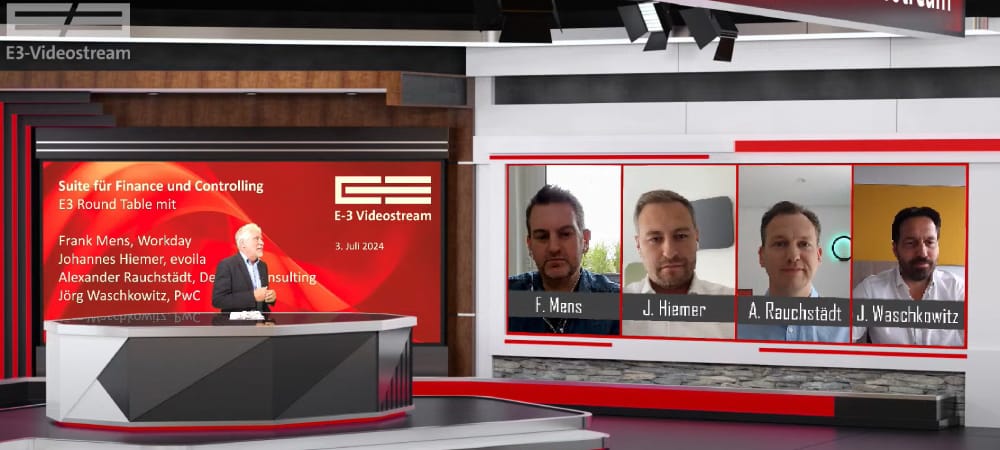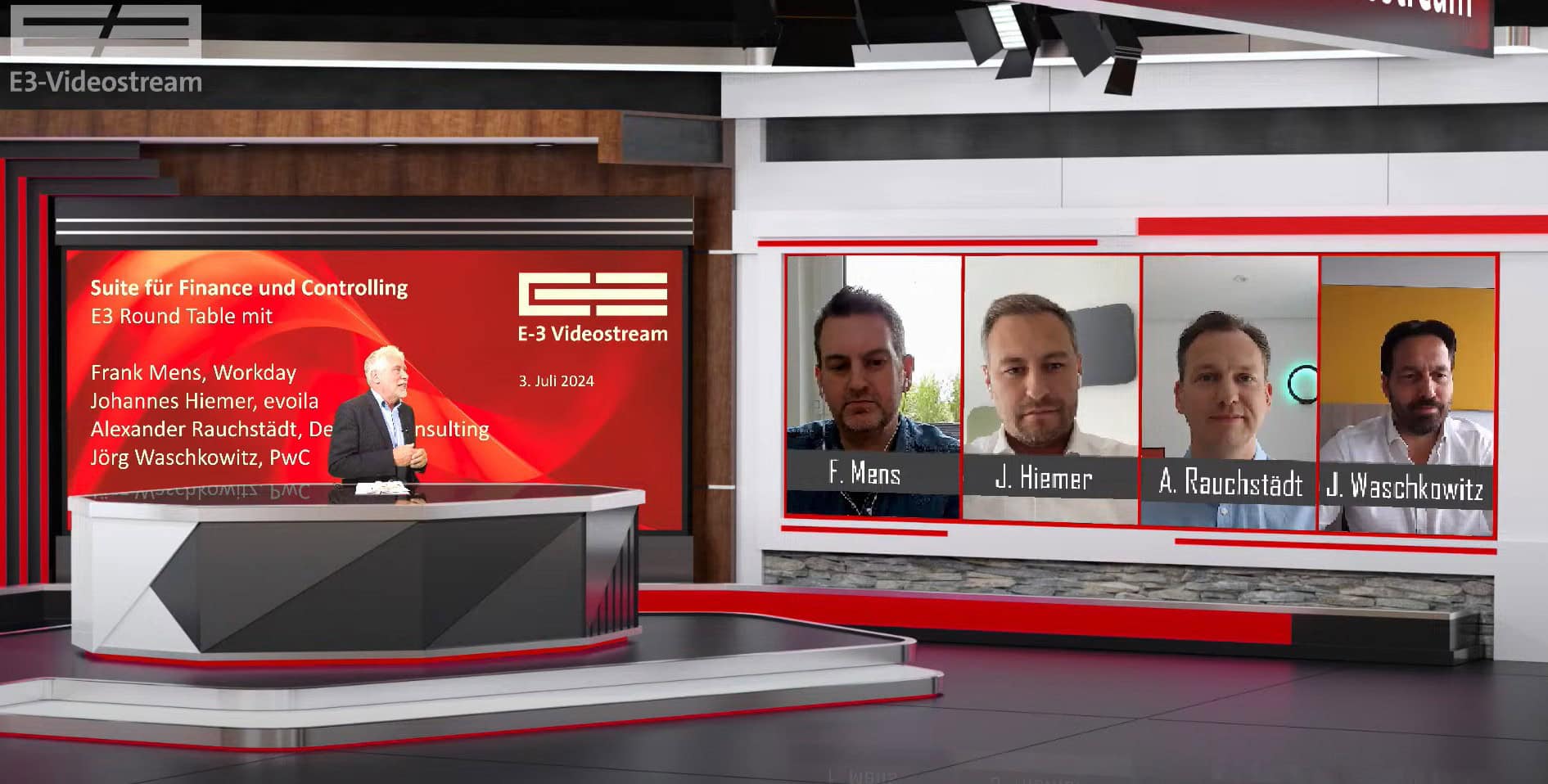Modern finance and controlling in the SAP community as an S/4 option: Shaping the future with Composable Enterprise


The boundaries are breaking down: existing SAP customers are also looking for ERP solutions beyond the SAP price and conditions list (PKL). One of SAP's long-standing core competencies is finance with the traditional R/3 modules FI, AM and CO - as accounting, asset accounting and controlling. However, modern supply chain planning, human capital management and customer relationship management as well as other ERP functions require a new approach to financial planning. The Chief Financial Officer is currently more of a helmsman than an accountant. The CFO is also an asset manager and ultimate controller, for which he needs new tools. Cloud-native provider Workday has found an answer to many of the challenges of modern finance.
E3 magazine hosted a round table to discuss the possibilities and opportunities of Workday's Finance Suite for existing SAP customers. The virtual round table took place on July 3 and was broadcast live via YouTube and LinkedIn. The participants were Frank Mens, Partner Executive Workday, Alexander Rauchstädt, Senior Manager in Digital Performance Management at Deloitte, Jörg Waschkowitz, Management Consulting Finance at PWC, and Johannes Hiemer, CEO Germany at Evoila, as a user and thus proof-of-concept in the E3 round table. A recording is free of charge at available on the E3 YouTube channel.
Why Workday? "We are now a real alternative on the German-speaking market and are actively sought after by many companies," explains Workday manager Frank Mens at the start of the E3 discussion. "Customers are often faced with the decision: Do they carry on as before or do they look for alternatives? And nobody can avoid Workday anymore."
Of course, every financial system has to offer basic functions such as accounting and closing. But as a US provider, this was initially a challenge for Workday in Germany. "However, we have successfully overcome this hurdle and have certificates in Germany, Austria and Switzerland," explains Frank Mens. "The key point, however, is how we position finance on a more strategic level. We enable finance departments to have a seat at the table when it comes to making important decisions, shaping the future and driving change. That's the main reason organizations choose Workday. It's not just about accounting - anyone can do that."

Plan and think strategically
Next-generation financial software is designed to help companies plan more strategically and look to the future. "Our aim is to offer more transparency and agility so that companies can react more quickly to changes and adapt their processes," confirms Workday manager Frank Mens. The finance departments, and not just those of existing SAP customers, are driving this agility forward. In doing so, they provide the C-level with valuable insights.
For ERP innovations such as a strategic finance suite, the question naturally arises for an established SAP customer: how can the change, the digital transformation, succeed? "Change management is a crucial aspect and I believe that it is essentially about not just informing the people in the company, but really taking them with you," emphasizes Deloitte manager Alexander Rauchstädt in the E3 live discussion. "It's about creating trust and guiding employees through the change process step by step."
Jörg Waschkowitz, Management Consulting Finance at PWC, confirms the statement of his colleague from Deloitte: "It's about establishing clear communication and ensuring that everyone understands why these changes are necessary. A key component is to actively involve employees in the process and take their perspectives into account. This helps to reduce resistance and promote a positive attitude towards the changes." And Alexander Rauchstädt again: "Our job as consultants is not only to support the technical implementation, but also to ensure that the people in the company understand the changes and feel comfortable with them. We often work closely with managers to ensure that they credibly communicate and exemplify the changes within the company."
A structured approach seems important. Workshops are a very important component because they allow the consultants from Deloitte and PWC to work directly with employees and address their specific questions and concerns. "We also bring models and proven approaches that we have already used successfully in many projects," explains Jörg Waschkowitz, adding: "But it's not just about workshops. We also have various tools and methods that we use to support the entire process.
Z. For example, we work with change management and transformation management approaches that are specifically tailored to the requirements of the Workday platform. In this way, we ensure that the entire process runs smoothly and that the changes in the company are sustainable."
In the E3 round table, Workday manager Frank Mens elaborates on the statements made by the consultants from Deloitte and PWC: "Our platform is very good at focusing on people's needs, topics such as New Work, i.e. hybrid and remote working models, and collaboration between teams worldwide via the cloud. But also topics such as artificial intelligence, which we make widely available in order to create added value without losing sight of people. This concerns both data security and the use and quality of data for decision-making. It is also about mapping and automating processes in the company. That's something our software brings to the table."
It becomes clear in the E3 YouTube discussion that a process-based solution competence leads to the goal. The Workday Finance Suite is usually embedded in a higher-level ERP system, so that a holistic analysis is required from the Workday partners Deloitte and PWC, as PWC consultant Jörg Waschkowitz explains: "When we talk about an ERP implementation, we assume that we have selected the right ERP solution. We support our customers in this. That's how I came into the Workday ecosystem in 2017. Many companies approached us because they were looking for alternatives to their existing ERP provider. We then identified Workday as the right solution for the German market."
All participants in the E3 round table agree that starting a new ERP project is a big decision. It's not just about license or deployment costs, but also about a large internal effort. You have to provide people and resources, and this is usually in addition to their regular work. "Transparency is crucial here in order to select the right solution and plan the project properly. An ambitious schedule is important, but it is also important that employees are well involved in the project," emphasizes Jörg Waschkowitz.
Alexander Rauchstädt from Deloitte knows from numerous customer projects that it is the task of consultants to bring best practices with them, to know how they are implemented in Workday and to help customers leave old, inefficient processes behind. "Of course there is resistance," says Rauchstädt, "but as consultants, we moderate the process and ensure that the system is not overly customized. That way, it remains upgradeable and can be developed further." Jörg Waschkowitz from PWC adds: "An ERP project affects many people in the company. Change management begins with the selection of the solution. We have to involve the teams from the outset, allay their fears and gradually integrate them into the process."

Jörg Waschkowitz with E3 editor-in-chief Peter Färbinger.
Finance Suite with AI
Artificial intelligence is a key unique selling point in all Workday cloud products. For finance departments, this means being able to prepare decisions faster and better. For example, in the classic financial closing process. "Postings are often made up until the last day, then the books are closed and you start to check whether everything was correct," says Workday manager Frank Mens, explaining the challenge. "You look for posting outliers and errors to ensure a clean closing. That can take three to four days. What we do is continuously check the system for booking anomalies using an AI algorithm. This algorithm analyzes over 10,000 transactions and recognizes what is a booking outlier or a booking error. This allows accounting departments to identify and correct errors in real time, significantly reducing the time it takes to close the month."
However, AI models only work if sufficient data is available to train the algorithms. A medium-sized company in Germany often does not have the database to use AI effectively. "At Workday, we have millions of transactions every day and many of our customers allow us to use anonymized and protected data to train the algorithms. This is Workday's strength in the field of AI," emphasizes Frank Mens.
There are rumors that the German Commercial Code (HGB) is less known at Workday. Is this an issue or can it be confirmed that Workday complies with the local legal requirements in the respective countries? Frank Mens: "This is absolutely not an issue. Otherwise we wouldn't have the large number of customers in different countries, such as Johannes with Evoila. If we couldn't do that, there would be no customers and partnerships with consultants such as Deloitte or PWC would also be difficult. We support the local jurisdiction in each country and the number of our clients and our partner network clearly prove that these rumors are unfounded."
Johannes Hiemer, CEO Germany at Evoila, provides a proof of concept: "We went live last year in November and are currently working on the roll-out in various countries. At the moment, we are mainly using the AI functions for booking validation. Our colleagues in accounting are already using it very actively. This year, we are monitoring developments in AI support and plan to roll out these functions on a larger scale next year when all countries are on the platform."
ERP rollouts have been a daily challenge in the SAP community right from the start, as Johannes Hiemer explains: "We made a clever move at the beginning by going live not only in Germany but also in Austria. This gives us an international set-up. We have taken into account the differences between the countries, such as in labor law. We are currently in the process of rolling out Poland and Bosnia. The implementation times are shorter than for the initial roll-outs in Germany and Austria, as we have already developed standardized processes and a good basis." Johannes Hiemer is particularly proud of the short implementation times: "It's a mixture of everything. We have tried to streamline the processes and standardize them at an international level. Together with PWC, we critically analyzed which processes could be improved in the initial phase. A standardized platform based on basic configurations and focused on the deltas makes the roll-outs much easier."
Even without modifications
To what extent are the organizational and operational structures of a company adapted when Workday Finance comes into the company? That's a good question, says Alexander Rauchstädt and explains: "We take a different approach these days. As a rule, we no longer start from scratch by documenting the customer's existing processes for years and then laboriously developing new target processes. Instead, we bring our proven processes with us, which we consider to be efficient, highly automated and compliant. Our aim is to stay as close to the standard as possible, as this offers many advantages, such as future updates and greater efficiency. When implementing Workday Finance, we look at the customer's processes and check how our standard processes can be applied to them. We then ask why these standard processes might not work for that particular customer and adapt them if necessary."
The decision on the extent to which Workday Finance is adapted to existing processes or vice versa is usually made by the deployment project team.
Frank Mens comments: "The team works closely with the customer to ensure that we find the best solution. The cost of customization is an important issue and it is crucial that everyone involved has a clear understanding of what is needed and the costs involved."
PWC recommends that customers stick as close as possible to the standard in order to fully exploit the benefits of the system and make implementation efficient. "Of course, we also take the customer's specific needs into account and work together as partners to find the right balance," concludes Jörg Waschkowitz. "In summary, this means that the adaptation of processes and systems is a joint process in which we contribute our expertise while taking the customer's requirements into account. It's about finding the best possible solution that both integrates the standard process and meets the customer's specific needs."






